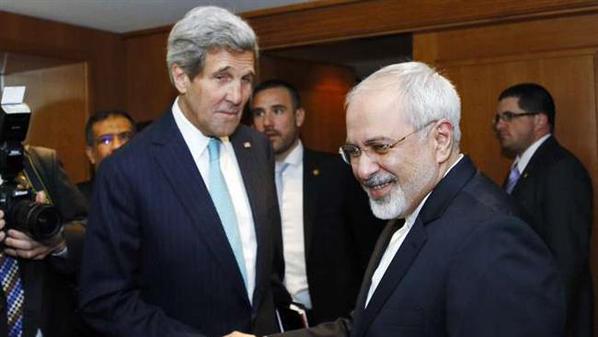Kerry, Zarif discuss Iran nuclear deal as deadline approaches
Reuters, AP/ Ynetnews
Latest Update: 06.27.15/Israel News
US secretary of state says he was ‘hopeful’ of a successful outcome to talks as he met with the Iranian foreign minister in Vienna. Senior US and Iranian officials said hard work was still needed as they met in Vienna on Saturday for what could be their final negotiations to bridge significant differences on an agreement to curb Iran’s nuclear program. “We have a lot of hard work to do. We have some very tough issues,” US Secretary of State John Kerry said according to a State Department draft transcript.
“I agree. Maybe not on the issues. But on the fact that we need to work really hard in order to be able to make progress and move forward,” Iranian Foreign Minister Mohammad Javad Zarif was cited as saying in the transcript. Nonetheless, Kerry also said he was “hopeful” of a successful outcome. His meeting with Zarif ended after 90 minutes. The main differences are on the pace and timing of sanctions relief for Iran in return for its steps to restrain its nuclear program and on the nature of monitoring mechanisms to ensure Tehran does not cheat on any agreement.The United States, Israel and some Western nations fear that Iran has been trying to develop a nuclear weapons capability but Iran says its program is for peaceful purposes only.
“The next few days will be extremely difficult,” a senior Western diplomat said on condition of anonymity, adding that the talks may slide at least two or three days past the deadline. Senior Iranian negotiator Abbas Araqchi told Iranian reporters that the current negotiations were a “slow and difficult process.” In addition to Iran and the United States, the talks include Britain, China, France, Germany and Russia. Foreign ministers from all the nations, as well as the European Union foreign policy chief, are expected in Vienna in the coming days.
The coming days could be extremely difficult and talks could go over the deadline by at least two or three days, a senior Western diplomat said on condition of anonymity. Officials close to the talks say they have yet to agree on the speed and scope of lifting sanctions, how Iran will reduce its stockpiles of low-enriched uranium, the future extent of Tehran’s enrichment-centrifuge research and development program, and access for United Nations inspectors to military and other sites, as well as UN access to Iranian nuclear scientists. Another outstanding issue is what Iran may be required to do to address questions about the potential military dimensions (PMD) of its past nuclear work. Iran wants sanctions lifted immediately, though diplomats say they will be eased gradually in accordance with a schedule and only after confirmation that Iran has met its commitments to curb its nuclear program.
Disagreements among world powers
A senior Iranian official warned that negotiations are hampered by differences not only between Tehran and the six other countries it is bargaining with but internally among the six as well.
Iran and the six countries at the negotiating table agreed in April on the outlines of a deal that would crimp Tehran’s nuclear activities for at least 10 years in return for sanctions relief for Tehran. But negotiators are finding it difficult to fine tune which sanctions should be lifted when and how open Iran must be to outside monitoring. Complicating issues, said Araghchi, was the fact that the nations Iran is negotiating with also differ in their approach to certain topics, “which may not be harmonized easily.” He did not offer details.
Signs that Iran is toughening its stance add to the likelihood that the talks could go past the target date. In a speech this week, Iran’s supreme leader, Ayatollah Ali Khamenei, rejected a long-term freeze on nuclear research and insisted that Iran will only sign a deal if international sanctions are lifted first. He also insisted that military sites and Iranian nuclear scientists will be off-limits to UN experts, who would monitor Iranian compliance to any deal while trying to kick-start a moribund probe of suspicions that Tehran worked on atomic arms – allegations that Iran denies.
Kerry subsequently suggested Khamenei was speaking to a domestic audience appreciative of a hard-line stance and said that a deal would be out of reach if Tehran also reneges on its commitments at the negotiating table. Still, Khamenei’s comments added to skepticism among some US legislators who already believe the Obama administration has grossly backslid on its positions in efforts to achieve an agreement.
Democratic Senator Bob Menendez, a key critic of the negotiations, called Khamenei’s demands “unacceptable,” in a letter to Kerry on Friday.”If Iranian negotiators intend to adhere to the provisions demanded by Ayatollah Khamenei and Iran’s parliament, I urge you to suspend the current negotiations with Iran,” he said. Araghchi said the negotiators were still aiming for a June 30 deal. But the more important target date is July 9. The US delegation must present the deal to Congress by July 9 if a mandatory congressional review period before President Barack Obama can begin suspending sanctions is to be limited to 30 days. After July 9, the review will last 60 days, according to a law passed recently by US legislators Negotiators involved in the talks fear that such a lengthy delay, which would also hold up the cancellation of United Nations nuclear-related sanctions by the UN Security Council, would be too long and would create the opportunity for any deal agreed in Vienna to unravel.






















